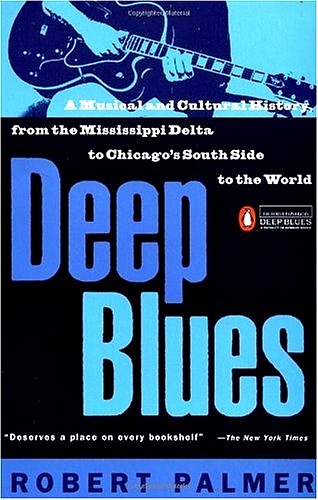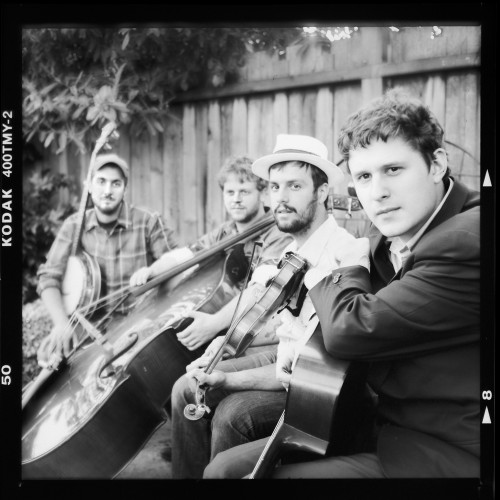
My co-blogger and I are both tremendous consumers of books as well as of music. Naturally, we also read books about music, and you’ve seen a few examples of that sneak in here and there – Jennifer’s review of Keith Richards’ Life, my write-up of B-Sides and Broken Hearts by Caryn Rose, and the recent blurb about Put the Needle on the Record by Matthew Chojnacki – and there are more to come. To that end, we introduce Now Read This, where we’ll write about music-related books that we get our grubby, grabby hands on.
To inaugurate our new title tag, I am very pleased to present a review of Deep Blues by renowned music journalist/musician Robert Palmer (not that Robert Palmer) from the man who thought of our clever new tag, kick-ass friend of NTSIB, Rick Saunders. (If’n you don’t know, Rick is the commander of his own wonderful blog, also known as Deep Blues. He is the only person I know who can consistently recommend music to my idiosyncratic self, so if you like what I write about here, you’re going to love Rick’s blog.)
“Anybody singing the blues is in a deep pit telling for help.” – Mahalia Jackson
“The blues ain’t nothin’ but a good woman feelin’ bad. You got a good woman, she ain’t feelin’ good, get her to feelin’ good. Say amen, somebody.” -Rev. Thomas A Dorsey aka Georgia Tom
The blues is the high loud Yop! The Om. The first cosmic sound. It’s a cry in the wilderness. The human or bestial wail. Which is worse? The baby about to be born or the man about to be hung? Ain’t that the blues? Rockabilly guitarist Charlie Feathers said of Mississippi hill country blues master Junior Kimbrough “The beginning and end of all music.” So, too, is blues music.
From our earliest known history in Africa, every society has had its blues. As we spread across the earth we brought our blues, and those blues mixed with the blues of others. Delta blues, country blues, gypsy blues, Tuvan blues, British blues, Piedmont blues, Chicago, St. Louis, Mississippi, Louisiana blues. They all retain the root. The human condition and the music it brings forth, the deep blues.
Robert Palmer weaves not only the raw history of the Delta blues – the who, what, when, where and why of the blues – but more importantly, the human story behind the music. With Delta blues great Muddy Waters as his protagonist, Palmer breathes new life to the Delta blues story.
We follow Muddy Waters (McKinley Morganfield) from a rude Mississippi shack on the Stoval Plantation where he drove a tractor for twenty-two and a half cents an hour to a solid two-story brick home in Chicago and life as not only a living legend, but one of the most important progenitors of Delta Blues music.
As we follow, Palmer introduces us to the blues high society, the aristocracy, if you will. Names like Howlin’ Wolf, Little Walter, Son House, Robert Jr. Lockwood, Sonny Boy Williamson, as well as their aliases. Palmer shows us and helps us to understand how they lived and spares few details. Perhaps more importantly, Palmer explains the worldwide importance of Delta blues music.
The way we play guitar, the use of a metal tube, glass bottleneck or even a steak bone to slide across the guitar’s neck by Delta musicians like Muddy Waters, R.L. Burnside, Mississippi Fred McDowell, Elmore James and countless others set the tone for later hard rock and heavy metal groups. The use of distortion and feedback to augment the sound, again now commonly used worldwide, stems from Delta blues, which, of course, stems from Africa and the buzzing of the strings on the one-string precursor to the banjo and the rattle of crude drums. As Palmer explains, it was Delta musicians that first put feedback and distortion to use, now these techniques are wholly common and put to use worldwide. Both techniques bring a sound to life that emulates crying, the tears of the broken-hearted and oppressed. That’s the soul of the blues.
The piano, too, gained a terrific boost from the innovation of Delta blues artists like Roosevelt Sykes and Muddy Waters’ accompanist Joe Willie “Pinetop” Perkins. Their percussive, boogie-woogie style of piano playing, with its infectious, driving, rollicking sound, brought the piano boogie out of the Delta’s juke joints and spread it throughout the world, influencing generations of pianists.
Our language contains common words like jive, hip, hip cat, banjo, and more, all sourced from the Wolof people of the Senegal and Gambian or Senegambian coast, a favored slave trading region. The way we sing, too, stems from Delta blues. The use of call and response, a common technique in musical styles as varied as blues, gospel, rap, old timey country, and instrumental jazz, as well, finds its roots in Africa and the slave trade.
The lowly one-string diddley bow, now in a resurgence of popularity, along with the cigar box guitar, originated in the Delta region. The diddley bow, often built by removing and tacking the wire that holds a straw broom together to the side of a house and using a glass bottleneck, heated over a flame to smooth its jagged edges, for a slide, was the starting point for many Delta would-be guitarists. Artists such as Charlie Christian, Robert Pete Williams, Albert King, Big Bill Broonzy, Carl Perkins and countless others from the region started out on simple, homemade cigar box guitars. Made from a box that once held cigars, one could easily attach a length of scrap wood for a neck, a couple eyebolts for tuning pegs and one to four strings, and you’d have yourself a very inexpensive but great-sounding guitar.
Blues is the sound of poverty, the sound of oppression, the sound of heartache. Robert Palmer referred to it as music “created by not just black people but by the poorest, most marginal black people” who “could neither read nor write…owned almost nothing and lived in virtual serfdom”. But it can also be the sound of joy, the sound of making love and raising hell on Saturday night, and the sound of redemption come Sunday morning. Although, as Palmer points out, the blues and those who trade in it have almost always been looked down upon. “If you asked a black preacher…or faithful churchgoer what kind of people played and listened to blues, they would tell you, ‘cornfield niggers’.” This is an attitude that, in spite of a long history of deeply gospel-infected blues music by the likes of Blind Willie Johnson, Roebuck “Pops” Staples (a contemporary of Charley Patton’s on the Dockery Farms Plantation), Sister Rosetta Tharp, and others, continues to this day. For example, St. Louis record label Broke and Hungry Records has an artist on its roster that calls himself The Masked Marvel. He allows no pictures, and his name is unknown but to label boss Jeff Konkel, because he’s a deacon in his church and fears repercussions for playing the blues.
Robert Palmer’s use of Muddy Waters as protagonist was a perfect choice. Out of all the characters Palmer had to choose from, it’s Waters that best represents the history of Delta blues. From his humble beginnings in Mississippi to worldwide stardom and legendary acclaim, no Delta blues artist, save perhaps B.B. King (Waters’ junior by 12 years), has achieved so much. The main difference between the two, and between Waters’ and all others: Muddy Waters did it first. Now, that’s not to say he was the first Delta bluesman to play slide, or go electric, but what Waters did do is lay the template for those that followed. He proved that Delta blues could go national, and beyond. He set the groundwork for what Palmer, and now current groups like The North Mississippi Allstars, calls, “the world boogie”.
As Palmer writes, “Muddy adapted to survive”. By changing his song and lyrical style, and adopting a tougher approach to an already often tough-sounding music, he not only transformed himself into a more commercially-marketable personality, via songs like “Hoochie Coochie Man”, “Natural Born Lover”, “All Night Long”, “Mannish Boy” and others, Waters appeared as the man men wanted to be and the man the ladies wanted to be with. It was that harder, sexier sound, followed by the feral blues of Howlin’ Wolf, the fascinating rhythmic mashup of the Bo Diddley beat – part call and response field holler, part Illinois Central train rhythm (the train from Mississippi to Chicago) – that opened the door wide for the new sound, for better or worse, of rock and roll.
Robert Palmer, in one slim, two hundred and seventy-seven page volume, captured the stark reality of the Delta blues, the depth of its history and the story of its people in a way that had not been done before. Certainly there have been numerous other volumes published on the history of African-American music, but one would be hard pressed to find one with as much emotional sensitivity, attention to detail and historical and cultural depth as Deep Blues. Palmer writes, “How much thought … can be hidden in a few short lines of poetry? How much history can be transmitted by pressure on a guitar string?” Robert Palmer’s Deep Blues represents well “The thought of generations, the history of every human being who’s ever felt the blues come down like showers of rain”.










